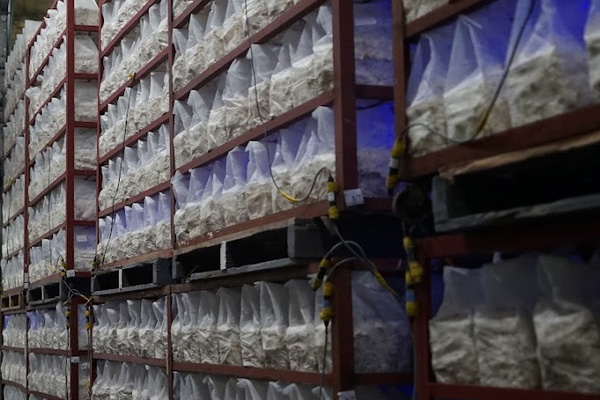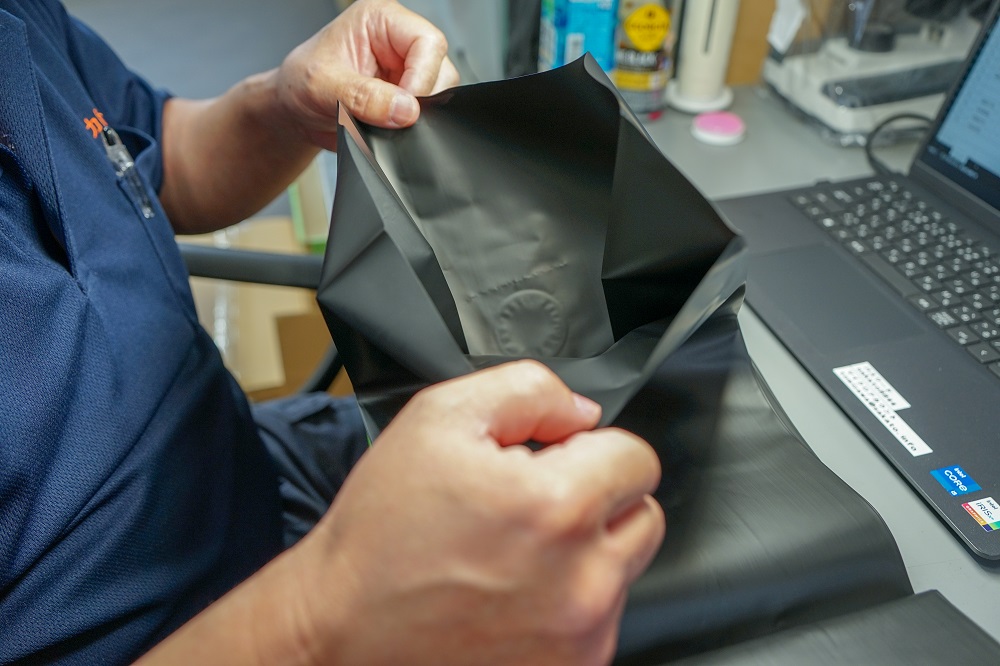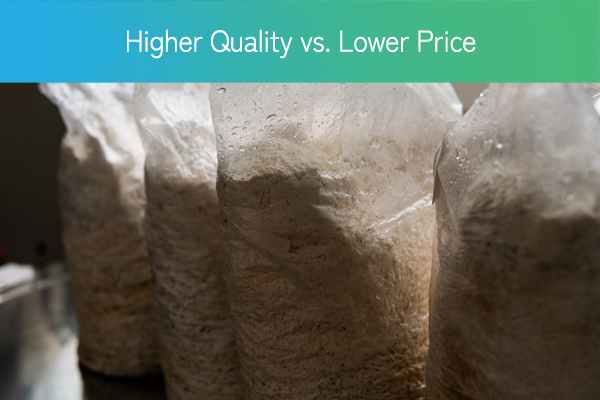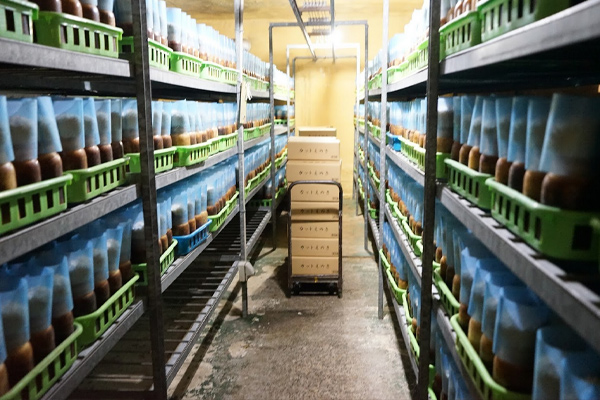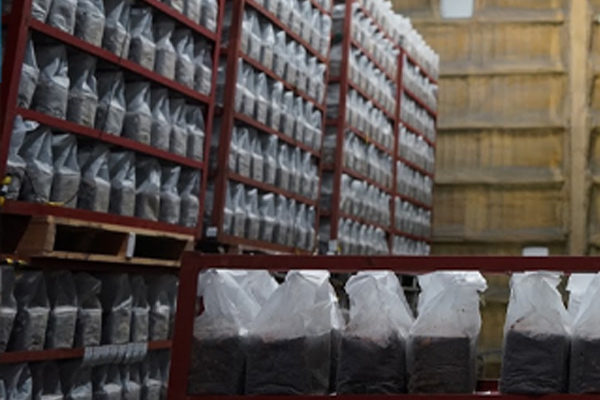
A primer on bag cultivation of exotic mushrooms
Mushroom enthusiasts and cultivators increasingly use bag cultivation methods to grow a fascinating array of exotic mushroom species. From the mesmerizing Lion's Mane to the delectable shiitake, bag cultivation offers a convenient and efficient way to nurture these elusive fungi. We’ll unveil this growing method’s secrets and guide both novice and experienced growers through the steps to successfully cultivate a diverse range of exotic mushrooms.To the laymen and even the beginner, the idea of using plastic bags is mystifying, or even off-putting. Button mushrooms grow in long beds of compost. Lots of mushroom growers outside of Japan start off growing oyster mushrooms (Pleurotus ostreatus), which are very hardy and fast-colonizing. Search oyster mushrooms and pictures of people growing them out of cuts in plastic drums of paint or even in cardboard boxes will pop up on search engines.Why use bags to grow mushrooms?
However, common exotic mushroom varieties other than oyster mushrooms are quite weak and many colonize a substrate much more slowly. Even oyster mushrooms will lose out to competitor molds or as a result fail to fruit/see fruiting yields much lower. Development of the bag system has truly been a key part of how Japan spearheaded the mass production of affordable shiitake, maitake, and nameko mushrooms (though nameko mushrooms are now mostly grown in bottle systems in Japan). The application of bags has helped production of wood ear mushrooms explode as well, (though in China, not Japan).Grow bags turn each block of substrate into its own separate biome. Bags provide stability, control, ease of handling, consistency, and more to an otherwise unpredictable process that is otherwise almost impossible to control. Substrate, in the case of exotic mushrooms, means a sawdust/wood chip medium. Modern cultivation supplements sawdust with wheat or rice bran and other supplements to add, easy to breakdown, carbohydrates and protein along with additional added mineral content to substrates. Western growers are also beginning to see the value of pH regulators like calcium bicarbonate (or lime, or ground oyster shells). Once the mixture is set, the water content of the substrate is adjusted (the range is anywhere from 61~70%), and using bag filling machines or manually, workers prepare each bag of mushroom substrate.How it works
- The real crux of a mushroom grow bag is what comes next: sterilization. The bag has to be able to handle sterilization in a 108~113-degree autoclave (high-pressure autoclaves can run at 118~121-degree temperatures), for four-hour heating cycles.
- Manufacturing plastic grow bags that don’t melt or deform or otherwise weaken during the sterilization process and subsequent handling is a major engineering challenge, to say nothing of attaching filters to each bag. Fungi, like animals, breathe in oxygen and breathe out CO2, which means a good filter has to allow air to flow in and out of the bag without letting in competitor molds and bacteria, or bugs.As soon as the substrate has fully cooled down after sterilization (and in Japan, modern autoclaves have double doors, with one end opening up into a clean room with reverse laminar air flow), workers then add spawn to the prepared substrate. Mushrooms, again, are not plants; fungi do not have seeds. Fungi do produce spores, but mushroom farming does not work by spraying spores onto substrate. The faster and more reliable method is to directly breed mycelium on another medium. This mycelium is called spawn, and spawning is when a portion of the bred mycelium is transplanted onto a new substrate, which it will then quickly colonize. In Japan spawn is produced on sawdust mediums, but in North America and Europe growers are using grain-based spawn because it is easier, cheaper and faster to produce.
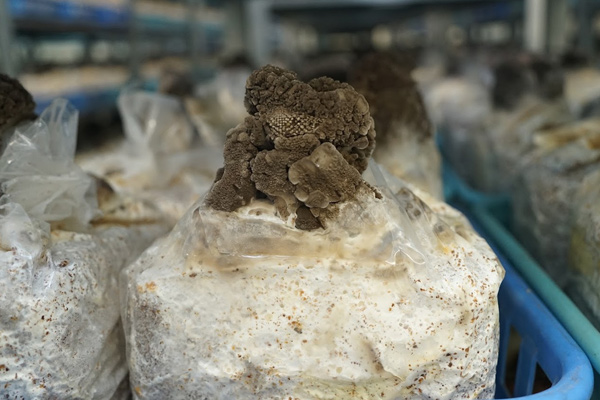
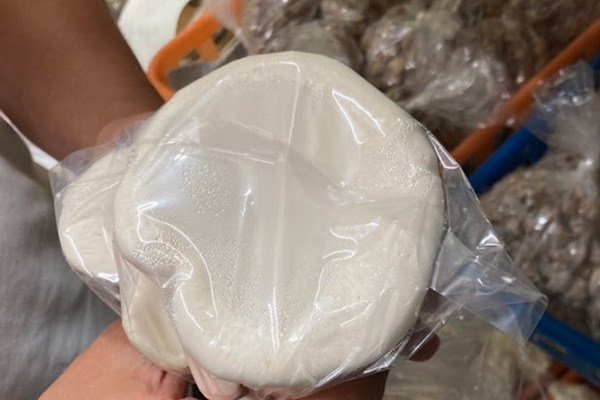
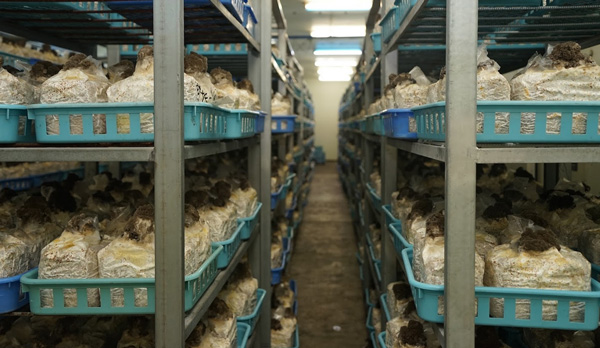
- After sealing, bags are moved to incubation rooms. Depending on the type of mushroom and cultivation system the entire bag or portion of the bag only, will be removed after incubation. Fully colonized substrate blocks then go into fruiting rooms. Once a substrate is fully colonized, the bag is no longer needed as the mycelium has firmly established itself and can in most cases protect itself, though it is still important to maintain a clean and sanitary environment in the fruiting room.
The complex part of mushroom grow bag fruiting
The hardest and most labor-intensive part of the process for mushroom farming comes last. With automation and fairly straightforward, easy-to-use machinery, all of the above processes can be run by teams of 3~4 employees producing thousands of blocks a day. Proper harvesting and packaging can take up over 70% of a farm’s labor needs. Storage logistics, and the often-overlooked struggle of selling a product with a limited shelf-life, also require a lot of labor and some more specialized skills and acumen.Bag cultivation allows for the climate controlled indoor cultivation of mushrooms on a massive scale. The level of control grow bags enable is the keystone to the entire process. A well-run process avoids premature pinning, contamination, fruiting failure, and lets a farm run on a maximally efficient basis, saving labor and getting the most out of all the inputs. For exotic mushrooms, wherever you go in the world, there is simply no other way to run a business growing mushrooms that does not use either bag or bottle cultivation systems. 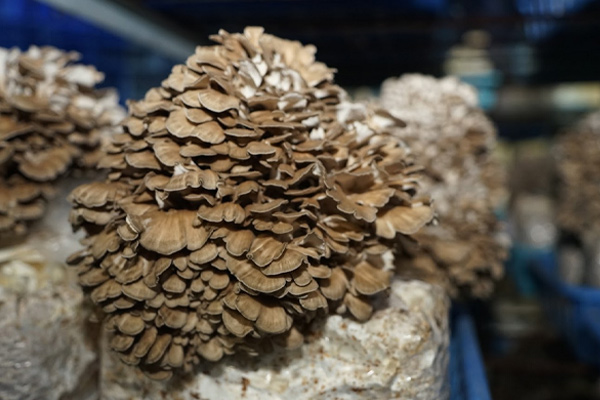
Advantages of the bag cultivation system
Bottle systems are discussed separately {here}, and have their advantages as well. However, in recent years, bag cultivation systems have been at the forefront of modernizing and expanding exotic mushroom cultivation in Western markets, particularly the U.S. and Canada. Bag cultivation systems have three big advantages that have enabled fast adaptation in the industry: flexibility, scalability and cost.For most of our clients, flexibility is the biggest point. While Japanese farms tend to focus entirely on one, or sometimes two, varieties of mushrooms, in North America and Europe farmers are growing six or seven varieties at any time, if not more. Bottle cultivation systems are unbeatable for the production speed and automation potential, but that comes with a built-in drawback: building that level of automation requires a great deal of customization. Sometimes one or two different varieties of mushrooms can be grown with the same bottle size and the same cultivation systems and buildings, but more often than not bottle systems are impractical and lose efficiency when running many different varieties all at once. Bag cultivation systems provide an extremely flexible, easy to manage system for producing a number of different varieties of mushrooms simultaneously.Scalability and cost are also big factors. Bottle systems become more economically efficient the larger the scale is. Simply put, the cost of filling and preparing 20,000 bottles of substrate a week, in terms of basic machinery, is the same as that of filling 40,000 bottles of substrate a week. Bag systems work great for small and mid-scale sized farms and it’s easy to keep adding additional production lines as the operation grows. The initial investment is also much smaller for bag systems, as the equipment is generally smaller in scale, less complex, and much more inexpensive. Long term, between labor costs and the running costs of buying bags, bottle cultivation systems are much cheaper to run, but for small regional farms and new entrepreneurs working in a niche market in Western countries, it is much easier to expand and automate using relatively inexpensive bag cultivation systems compared to investments in bottle cultivation plants that run into the millions of U.S. dollars.